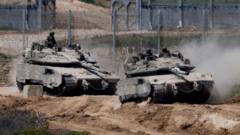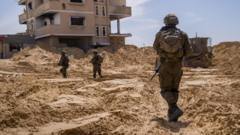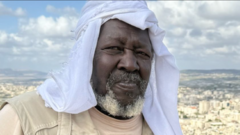Amid ongoing conflict, Israeli Prime Minister Benjamin Netanyahu announces a significant troop surge aimed at decisively defeating Hamas, while experts question its potential impact on a battle that has persisted for over 18 months.
Escalating Conflict: Israel's Military Strategy in Gaza

Escalating Conflict: Israel's Military Strategy in Gaza
As Israel prepares to intensify military operations in Gaza, doubts linger about the effectiveness of increasing troop numbers against Hamas.
As Israel looks to bolster its military presence with tens of thousands of reserve soldiers, Prime Minister Benjamin Netanyahu insists that this escalation is key to achieving a decisive victory over Hamas. “We have not finished the war,” he stated, underscoring the intent to conduct operations with a unified and powerful military force. Despite these assurances, analysts express skepticism regarding whether an influx of additional troops will significantly change the existing dynamic that has seen hundreds of thousands deployed without fulfilling objectives such as dismantling Hamas or securing the release of hostages.
The Israeli military's renewed air assaults come in the wake of a collapsed ceasefire that lasted two months until March and coincides with an ongoing blockade preventing essential supplies from reaching the beleaguered population of Gaza. Reports indicate that reservists have received call-up orders for deployment starting in June, raising concerns about the humanitarian crisis exacerbated by the current military strategy.
As speculation mounts over a possible military push prior to President Trump's visit to the region next week, there is a pressing question about the effectiveness of these tactics in a protracted conflict that continues to take a heavy toll on civilian populations caught in the crossfire. The prospect of increased hostilities poses significant implications for the already fragile situation in the Middle East, highlighting the urgent need for a reassessment of Israel's approach to Gaza.
The Israeli military's renewed air assaults come in the wake of a collapsed ceasefire that lasted two months until March and coincides with an ongoing blockade preventing essential supplies from reaching the beleaguered population of Gaza. Reports indicate that reservists have received call-up orders for deployment starting in June, raising concerns about the humanitarian crisis exacerbated by the current military strategy.
As speculation mounts over a possible military push prior to President Trump's visit to the region next week, there is a pressing question about the effectiveness of these tactics in a protracted conflict that continues to take a heavy toll on civilian populations caught in the crossfire. The prospect of increased hostilities poses significant implications for the already fragile situation in the Middle East, highlighting the urgent need for a reassessment of Israel's approach to Gaza.






















